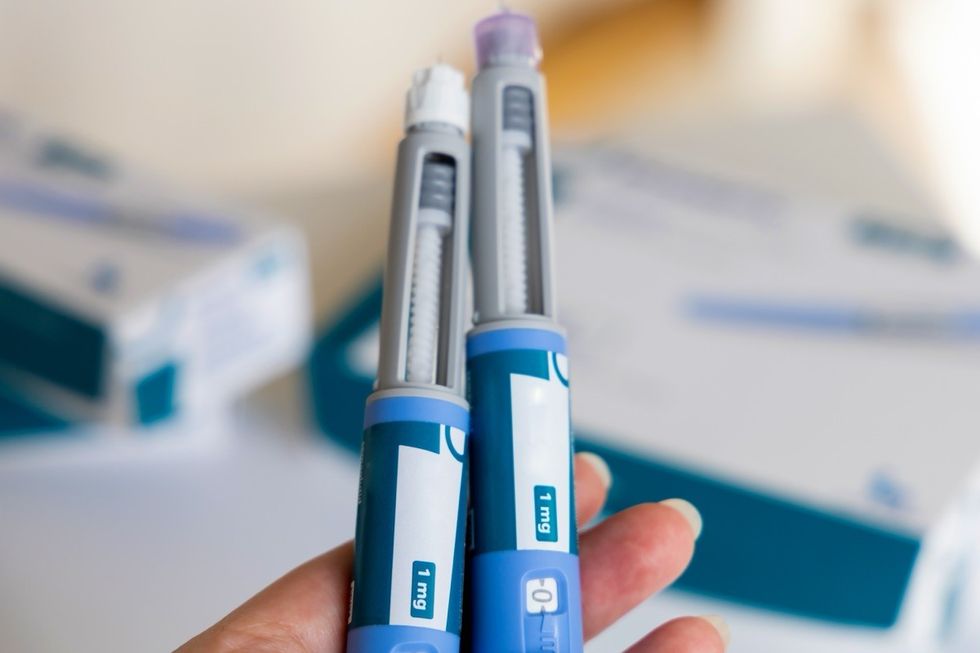There’s always a new headline about weight-loss drugs, whether it’s sharing new data on how many pounds someone has lost or a newly discovered side effect. Either way, there’s no denying that the treatments, including Novo Nordisk’s semaglutide injection Wegovy and Eli Lilly’s tirzepatide, make waves. But while they’ve been life-channging for some, George Yancopoulos, co-founder and chief scientific officer of the biotech company Regeneron, suggests that this class of medications may not be as beneficial as you think.
RELATED: Patient Shares Another Ozempic Side Effect: “You Never Know What Will Set It Off.”
In a recent interview withFinancial Times, Yancopoulos said that weight-loss drugs, specifically glucagon-like peptide-1 (GLP-1) inhibitors, could actually cause “more harm than good.” (His company, Regeneron, is actively researching a drug that would help preserve muscle mass when taken with GLP-1 drugs.)
“I do think that the GLPs should be viewed with a lot of concern in terms of the way they’re actually being used in the real world,” he told the outlet. “They could be leading to successive changes in body composition that could be creating more harm than good in the long term.”
Yancopoulos takes issue with the muscle loss associated with the treatments. It’s worth noting that with any kind of rapid weight loss, the loss of lean muscle mass often occurs and can be problematic.
Still, things can become even more complicated, as those who discontinue the use of these medications often end up regaining the weight that they lost, “adding insult to injury,” Yancopoulos told Financial Times.
“When we look at weight reduction from any intervention, about one-third of the weight we lose tends to be lean mass, and that can be problematic,” Jaime Almandoz, MD, an associate professor of internal medicine in the Division of Endocrinology at UT Southwestern Medical Center in Dallas, told NBC News last year. “Lean mass is healthier and associated with better metabolism, so when we lose lean mass, we may lose some of that function.”
RELATED: “Turbocharged” Weight-Loss Drug Has Patients Losing 24% of Body Weight.
During an investors call earlier this year, Yancopoulos also highlighted the risk of muscle atrophy as “potentially irretrievable” and “catastrophic,” pointing to “major public health concerns” down the line, per BioSpace.
To combat this, Regeneron is currently testing a treatment called trevogrumab, which works to “boost the quality of weight loss in patients by preserving lean muscle in patients taking GLP-1 receptor agonists,” BioSpace reported.
The first data from Regeneron’s trial of trevogrumab is anticipated to be released in mid-2025. But it’s not the only treatment in the game. Late last month, data from the phase 2 HuMAIN trial of Rivus Pharmaceuticals’ once-daily oral drug, HU6, was released. In a press release outlining findings, the company stated that participants taking the drug experienced “statistically significant weight loss” but didn’t lose lean body mass.
As for Regeneron, the company isn’t completely opposed to GLP-1s, but Yancopoulos added that he’s “not sure that GLPs are really the true final answer.”
He told the Financial Times that we’d all like to shed weight, maintain muscle, and eat whatever we want in “the ideal world.” However, that’s not the reality right now.
“I do think that … an ideal future is one where we achieve a better, healthier way of fighting back against metabolic disease,” he concluded.

